Coding in 2023: Insights from the Stack Overflow Developer Survey
10th May, 2023 7 min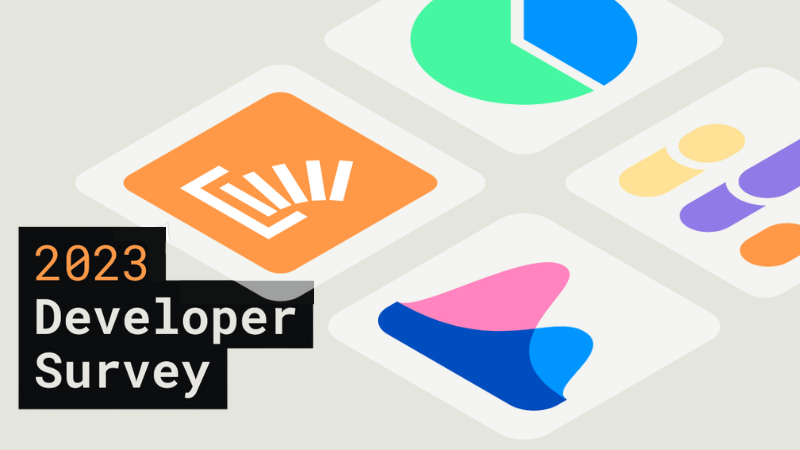
Step into the world of developers and uncover the latest trends, preferences, and insights from the Stack Overflow Developer Survey 2023. As we venture into this annual goldmine of data, we gain a profound understanding of the current state of the global developer community—exploring their favourite technologies and delving into their thoughts on various aspects of their profession. Get ready to explore the key findings from this year's survey, offering an exciting overview of the data that paints a vivid picture of the developer landscape.
A rich pool of insights
With an astounding 89,184 software developers participating from 185 different countries, this year's Stack Overflow report offers a robust and diverse set of perspectives. Among the respondents, 75% are professional developers, while 10% contribute to coding as part of their work or studies. The survey also encompasses those on the path of learning to code, hobby coders, and retired professionals.
Respondents from Australia and the United Kingdom boast an impressive average of 17.5 and 17 years of coding experience, respectively. In contrast, 48% of survey participants have less than a decade of coding under their belts. On the other end of the spectrum, 14.7% have been coding for one to four years, showing a rising interest in programming among newcomers. The majority, comprising 71% of respondents, have worked as professional developers for 14 years or fewer, reflecting the dynamic and ever-changing nature of the industry.
What type of education do developers typically have?
According to this year's survey, the majority of developers hold a post-secondary education, with 47% having earned a Bachelor's degree and 26% having attained a Master's degree. Notably, more than half of those learning to code fall within the 18-24 age range, indicating that they are likely still in school.
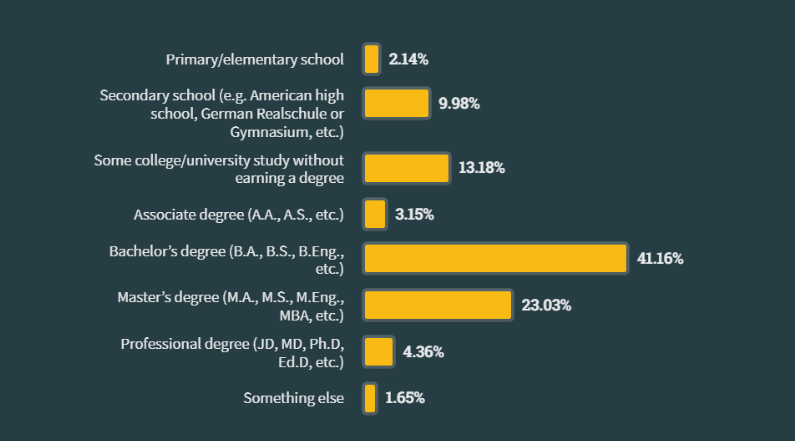
Where do developers acquire their coding skills?
The survey found that 70% of professional developers code outside of their regular work hours as a hobby. Of these, 37% engage in coding for professional development and self-paced learning through online courses. In comparison to the 2022 survey, there has been a significant increase in developers learning to code from online resources, rising from 70% to 80%. The majority of respondents aged 25-34 (52%) reported learning from online courses and certifications.
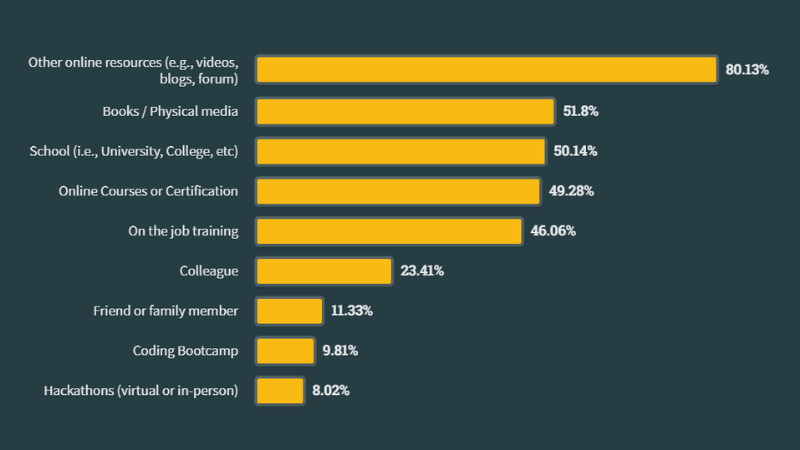
Consistent with previous years, technical documentation and Stack Overflow remain the most widely used online resources for learning how to code. Additionally, blogs, how-to videos, and written tutorials are among the top five resources commonly utilised by aspiring developers.
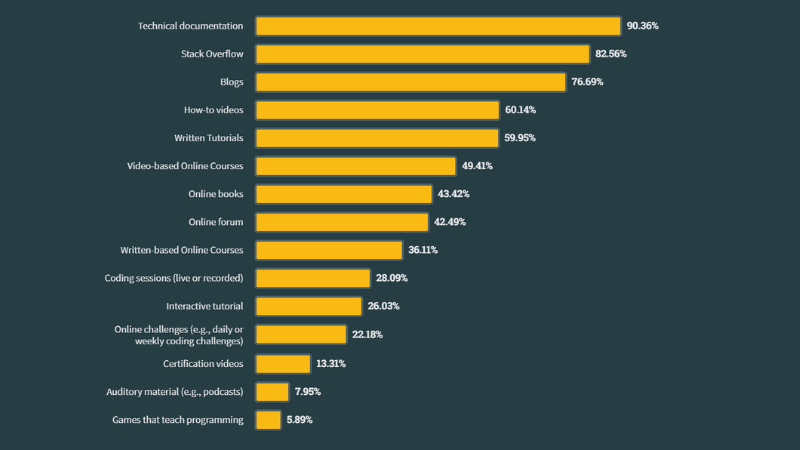
The most popular online course platforms for developers are as follows:
Udemy – 65.53%
Coursera – 34.62%
Codeacademy – 24.31%
Plusalsight – 22.83%
edX – 14.93%
Udacity – 10.77%
Skillsoft – 2.03%
These platforms offer a wide range of courses, allowing developers to enhance their skills and stay up-to-date with the latest technologies.
Which technologies are leading the pack in popularity?
As expected, JavaScript has firmly held its position as the most favoured programming language among developers for an impressive 11th consecutive year! Python, Java, and TypeScript also stand strong, reflecting their wide adoption across various domains. Furthermore, niche programming languages are gradually gaining traction, indicating their increasing relevance in specific industries.
Among professional developers, the top preferences have remained unchanged from the previous year - JavaScript, HTML/CSS, and SQL.
However, for those who are learning to code, HTML/CSS and JavaScript are almost neck-and-neck as the top choices. Python takes the lead with 59% of student developers preferring it, while professional developers lean more towards SQL (45%).
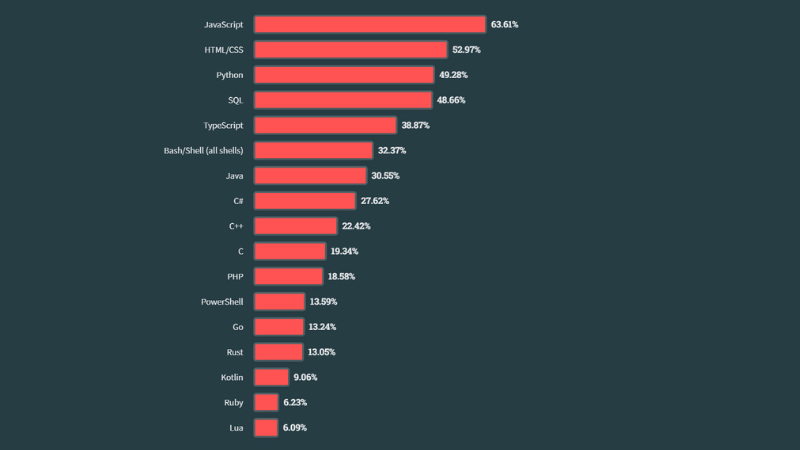
When it comes to databases, PostgreSQL emerged as the most popular among professional developers, whereas those learning to code tend to prefer MySQL.
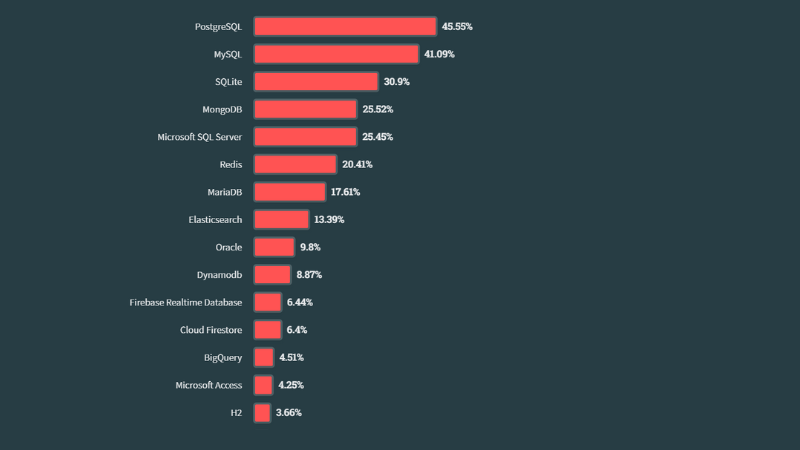
Cloud computing continues to revolutionise the industry, with AWS reigning as the undisputed favourite among all survey respondents, significantly outpacing Azure. While 30% of professional developers use Azure, only 15% of those learning to code have adopted it.
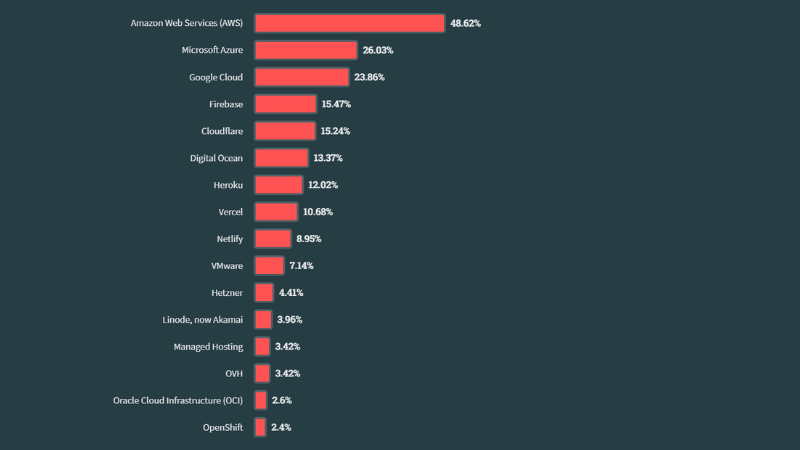
Among web technologies, Node.js and React.js stand out as the two most common choices among all respondents. While professional developers utilise both equally, those learning to code show a stronger inclination towards Node.js compared to React.
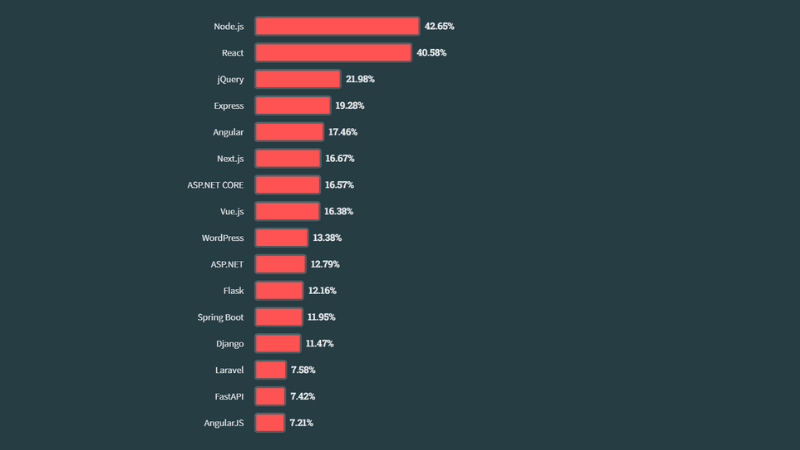
In the realm of frameworks and libraries, .NET (5+) retains its top position. However, NumPy and Pandas are gaining popularity among those learning to code, continuing the trend of Python-compatible libraries being preferred by novice developers.
The top-used other tool, according to 53% of all respondents, is Docker, which has risen a spot from last year's rankings. However, among those learning to code, npm or Pip are more popular choices compared to Docker.
AI's ascendance: ChatGPT and GitHub Copilot Lead
This year's report showcases the dominance of AI search tools, with ChatGPT being the top choice among developers (83%), followed by Bing AI with limited usage (20%). Looking ahead, 42% of ChatGPT users consider exploring alternatives like Google Bard or Bing, but an impressive 79% plan to remain loyal to ChatGPT.
Among AI developer tools, GitHub Copilot emerged as the clear winner, utilised by 55% of developers. Tabnine secured second place with 13% adoption. Notably, over 70% of GitHub Copilot users intend to continue using it next year.
AI's influence is undeniable, with ChatGPT and GitHub Copilot at the forefront, revolutionising the development landscape and promising innovative possibilities for the future.
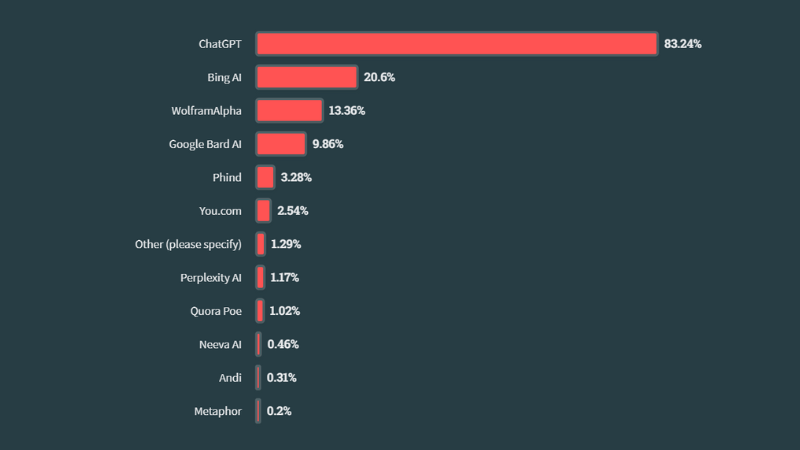
Most Sought-After Technologies & Tools
Programming, Scripting, and Markup Languages:
Replacing the old Loved, Dreaded, and Wanted analysis, Rust takes the lead as the most admired language, with over 80% of developers expressing a desire to use it again next year. On the other hand, MATLAB ranks as the least favoured language, with less than 20% of developers willing to use it in the future.
Databases:
PostgreSQL, Redis, and Datomic stand out as highly esteemed databases, with Datomic currently having the fewest users. Nonetheless, the appreciation for these databases should encourage more individuals to consider Datomic as a promising alternative.
Cloud Platforms:
Hetzner and Vercel have gained a significant user base, with over 69% of developers already utilising their services and expressing a desire to continue doing so. Interestingly, developers show a higher preference for these platforms compared to the industry's top three choices, namely AWS, Azure, and Google Cloud.
The top-paying language and developer salaries
Zig emerges as the highest-paid language of the year, making an impressive debut on the list. Conversely, Clojure loses its top spot, experiencing a 10% decrease in median pay compared to 2022. Dart and SAS witnessed remarkable growth in median pay, surging by over 20% year-over-year in 2023.
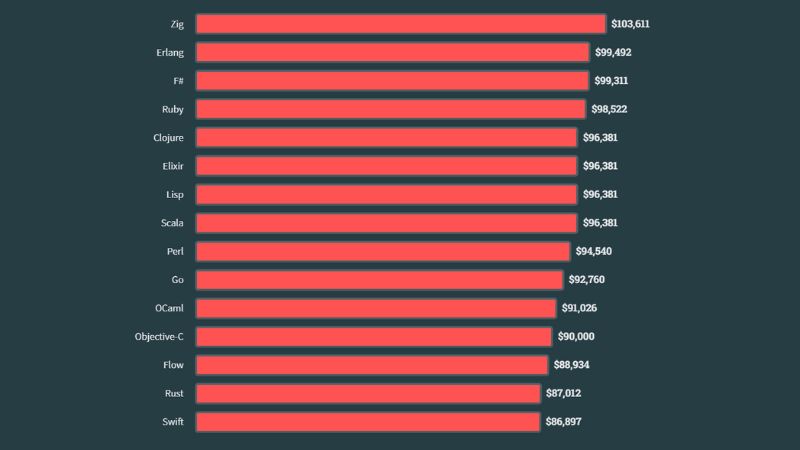
Developer Salaries:
The demand for tech talent continues to drive the rise in developer salaries across diverse industries. The survey provides valuable insights into salary discrepancies based on experience, location, and technology stack, offering intriguing perspectives on remuneration worldwide.
United Kingdom:
- Senior Executive (C-Suite, VP, etc.) - $155,173
- Engineering Manager - $117,931
- Cloud infrastructure engineer - $105,517
- Developer, mobile - $99,311
- DevOps specialist - $93,104
- Developer, back-end - $89,379
- Data scientist or machine learning specialist - $86,897
- Research & Development role - $86,897
- Developer, game or graphics - $82,552
- Engineer, data - $80,690
- Developer, desktop or enterprise applications - $77,715
- Developer, embedded applications or devices - $76,966
- Developer, full-stack - $74,483
- Developer, front-end - $71,689
- Academic researcher - $52,348
- Data or business analyst - $46,552
United States:
- Senior Executive (C-Suite, VP, etc.) - $220,000
- Developer Experienced - $210,000
- Product manager - $198,500
- Engineering manager - $195,000
- Cloud infrastructure engineer - $185,000
- Engineer, site reliability - $180,000
- Security professional - $173,000
- Developer, back-end - $165,000
- Developer, mobile - $163,000
- Data scientist or machine learning specialist - $160,000
- DevOps specialist $160,000
- Engineer, data - $160,000
- Research & Development role - $160,000
- Developer, game or graphics - $158,000
- Designer - $151,000
- Developer, embedded applications or devices - $140,000
- Developer, front-end - $140,000
- Developer, full-stack - $140,000
- Hardware Engineer - $140,000
- Scientist - $132,500
- Developer, desktop or enterprise applications - £130,000
- Project Manager - $125,000
- Developer, QA or test - $124,000
- Database administrator - $120,000
- Data or business analyst - $105,000
- Educator - $100,000
- Academic researcher - $90,000
- System administrator - $87,500
See the full breakdown here.
Remote work & job satisfaction
The survey highlighted that the majority of developers now prefer a hybrid work model, offering the flexibility to work both from the office and remotely. Over half of employees in 5,000+ organisations are hybrid. On the other hand, smaller organisations are more likely to be in-person with one in five organisations with fewer than 20 employees being in-person. More than a third of organisations of all sizes are still fully remote.
The Stack Overflow Developer Survey 2023 has once again provided a comprehensive snapshot of the developer landscape, shedding light on emerging trends and reflecting the industry's ongoing evolution. From programming languages and frameworks to cloud services and remote work preferences, developers are continually adapting to meet the demands of the ever-changing tech landscape. With ethical considerations and diversity taking centre stage, the developer community is actively shaping a more inclusive and responsible future. As we bid adieu to another exciting survey year, we eagerly await the developments and transformations that lie ahead in the tech world.
To view the full 2023 report head to Stack Overflow’s website


